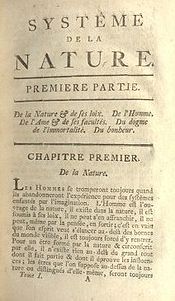 Paul-Henri Thiry, Baron d'Holbach (French: [dɔlbak]), was a French-German author, philosopher, encyclopedist and prominent figure in the French Enlightenment. He was born Paul Heinrich Dietrich in Edesheim, near Landau in the Rhenish Palatinate, but lived and worked mainly in Paris, where he kept a salon. He was well known for his atheism[3] and for his voluminous writings against religion, the most famous of them being The System of Nature (1770).
Paul-Henri Thiry, Baron d'Holbach (French: [dɔlbak]), was a French-German author, philosopher, encyclopedist and prominent figure in the French Enlightenment. He was born Paul Heinrich Dietrich in Edesheim, near Landau in the Rhenish Palatinate, but lived and worked mainly in Paris, where he kept a salon. He was well known for his atheism[3] and for his voluminous writings against religion, the most famous of them being The System of Nature (1770).Biography
Sources differ regarding d'Holbach's dates of birth and death. His exact birthday is unknown, although records show that he was baptised on 8 December 1723.[citation needed] Some authorities incorrectly give June 1789 as the month of his death.
D’Holbach's mother Catherine Jacobina née Holbach (1684–1743) was the daughter of Johannes Jacobus Holbach (died 1723) the Prince-Bishop's tax collector for the Roman Catholic Diocese of Speyer. His father, Johann Jakob Dietrich, (with other notations: ger.: Johann Jakob Dirre; fr.: Jean Jacques Thiry) (1672–1756) was a wine-grower.
D’Holbach wrote nothing of his childhood[citation needed] though it is known he was raised in Paris by his uncle Franz Adam Holbach, (or Adam François d’Holbach or Messire François-Adam, Baron d’Holbach, Seigneur de Heeze, Leende et autres Lieux)[4] (approx. 1675–1753), who had become a millionaire by speculating on the Paris stock-exchange. With his financial support, d’Holbach attended the Leiden University from 1744 to 1748. Here he became friends with John Wilkes.[5] Later he went on to marry his second cousin, Basile-Geneviève d'Aine (1728–1754), on 11 December 1750. In 1753, a son was born: Francois Nicholas who left France before his father passed. Francois moved through Germany, Holland, and England before arriving in USA (per American family bible/German and Italian references). In 1753 both his uncle and his father died, leaving d'Holbach with an enormous inheritance, such as Heeze Castle, Kasteel Heeze te Heeze.
D’Holbach would remain wealthy throughout his life.[6] In 1754, his wife died from an unknown disease. The distraught d’Holbach moved to the provinces for a brief period with his friend Baron Grimm and in the following year received a special dispensation from the Pope to marry his deceased wife's sister, Charlotte-Suzanne d’Aine (1733–1814).[7] They had a son, Charles-Marius (1757–1832) and two daughters Amélie-Suzanne (13 January 1759) and Louise-Pauline (19 December 1759 – 1830).[8]
During the summer months, when Paris was hot and humid, Baron d'Holbach retreated to his country estate at Grandval, Le Château de Grand-Val[9] (Sucy-en-Brie today N° 27 rue du Grand-Val on the outskirts of Paris (Département Val-de-Marne).[10][11] There he would invite friends to stay for a few days or weeks, and every year he invited Denis Diderot.[12]
D'Holbach was known for his generosity, often providing financial support discreetly or anonymously to his friends, amongst them Diderot. It is thought that the virtuous atheist Wolmar in Jean-Jacques Rousseau's Julie, ou la nouvelle Héloïse is based on d'Holbach.[6]
Holbach died in Paris on 21 January 1789, a few months before the French Revolution.[13] The authorship of his various anti-religious works did not become widely known until the early 19th century. Ironically, he was buried in the Church of Saint-Roch, Paris. The exact location of the grave is unknown.[14]
---------------------------------------------------------------------------------------------
The System of Nature
The System of Nature or, the Laws of the Moral and Physical World (Système de la Nature ou Des Loix du Monde Physique et du Monde Moral) is a work of philosophy by Paul-Henri Thiry, Baron d'Holbach (1723–1789). It was originally published under the name of Jean-Baptiste de Mirabaud, a deceased member of the French Academy of Science. D'Holbach wrote and published this book – possibly with the assistance of Diderot[1] but with the support of Jacques-André Naigeon – anonymously in 1770, describing the universe in terms of the principles of philosophical materialism: The mind is identified with brain, there is no "soul" without a living body, the world is governed by strict deterministic laws, free will is an illusion,[2] there are no final causes, and whatever happens takes place because it inexorably must. Most notoriously, the work explicitly denies the existence of God, arguing that belief in a higher being is the product of fear, lack of understanding, and anthropomorphism.
Though not a scientist himself, d'Holbach was scientifically literate and he tried to develop his philosophy in accordance with the known facts of nature and the scientific knowledge of the day, citing, for example, the experiments of John Needham as proof that life could develop autonomously without the intervention of a deity. It makes a critical distinction between mythology as a more or less benign way of bringing law ordered thought on society, nature and their powers to the massesand theology. Theology which, when it separates from mythology raises the power of nature above nature itself and thus alienates the two (i.e. "nature", all that actually exists, from its power, now personified in a being outside nature), is by contrast a pernicious force in human affairs without parallel.[3] Its principles are summed up in a more popular form in d'Holbach's Bon Sens, ou idées naturelles opposees aux idées surnaturelles.[4]

No comments:
Post a Comment